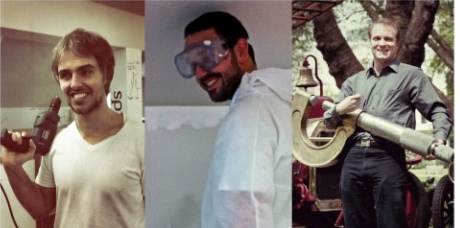A fraud busting start-up

Imperial Computing graduates Ashley Brown and Simon Overell talk about their online fraud-busting start-up spider.io, recently acquired by Google.
What does your company do?
Simon: We focus on combating online advertising fraud. Display advertising has historically been built on trust and on direct relationships between advertisers and publishers. That worked fine in 1999, but as the industry has become more complicated it’s become easier for people to cheat the system - often with the help of automated software programs or ‘bots’. Analysis shows that between 16 and 55% of display advertising networks are fraudulent. Our company is about spotting and exposing that fraud.
How did it form?
Simon: Our colleague and fellow Imperial alumnus Douglas de Jager started a company called BytePlay in April 2010, while he was still at Imperial. When Douglas sold BytePlay he founded spider.io and he bought me in - we met because we did a PhD at the same time - and then Ashley joined a bit later.

L - R: Dr Douglas de Jager, Dr Simon Overell and Dr Ashley Brown
What’s the most interesting case of fraud that you’ve come across?
Ashley: In 2013 we revealed the chameleon botnet - we’d seen traffic committing ad fraud on a huge scale. By disassembling it we were able to see what it was doing, which was basically to run lots of windows in the background loading websites.
Simon: We saw 25 windows that were all entirely hidden and stacked one on top of another. When we tiled them you could see mice moving in all the windows, navigating around.
How do you know when you’ve conquered something?
Simon: You don’t - it’s basically an arms race. Whenever you stop a particular attack, a new attack will spring up as they try to work around what you’ve identified.
The ultimate aim is to make advertising fraud uneconomical. I think that’s a feasible task, but there will always be something economical that people with access to thousands of PC’s can do to make money.
How difficult was it to build the company up?
Ashley: It was hard - I had a few 24-hour days in the year running up to the acquisition! I was setting the computer off to do something for a few hours, going to sleep for two hours, waking up and starting it all over again. We had an idea of what we wanted to achieve and we needed to do it quickly, but luckily that was only for a few weeks.
How did it feel to be acquired by Google?
Ashley: All you want to do when you’re running a small company is make a big difference with the resources that you have, and I feel like we made that difference.
Do you have any advice for current students?
Ashley: My advice is directed at people who aren’t thinking of going into something entrepreneurial – I hadn’t really looked into it but it turned out to be good fun. You can strike out and try some things by yourself or with some friends, and you get to test exciting new ideas.
Article text (excluding photos or graphics) © Imperial College London.
Photos and graphics subject to third party copyright used with permission or © Imperial College London.
Reporter
Jessica Adams
Advancement